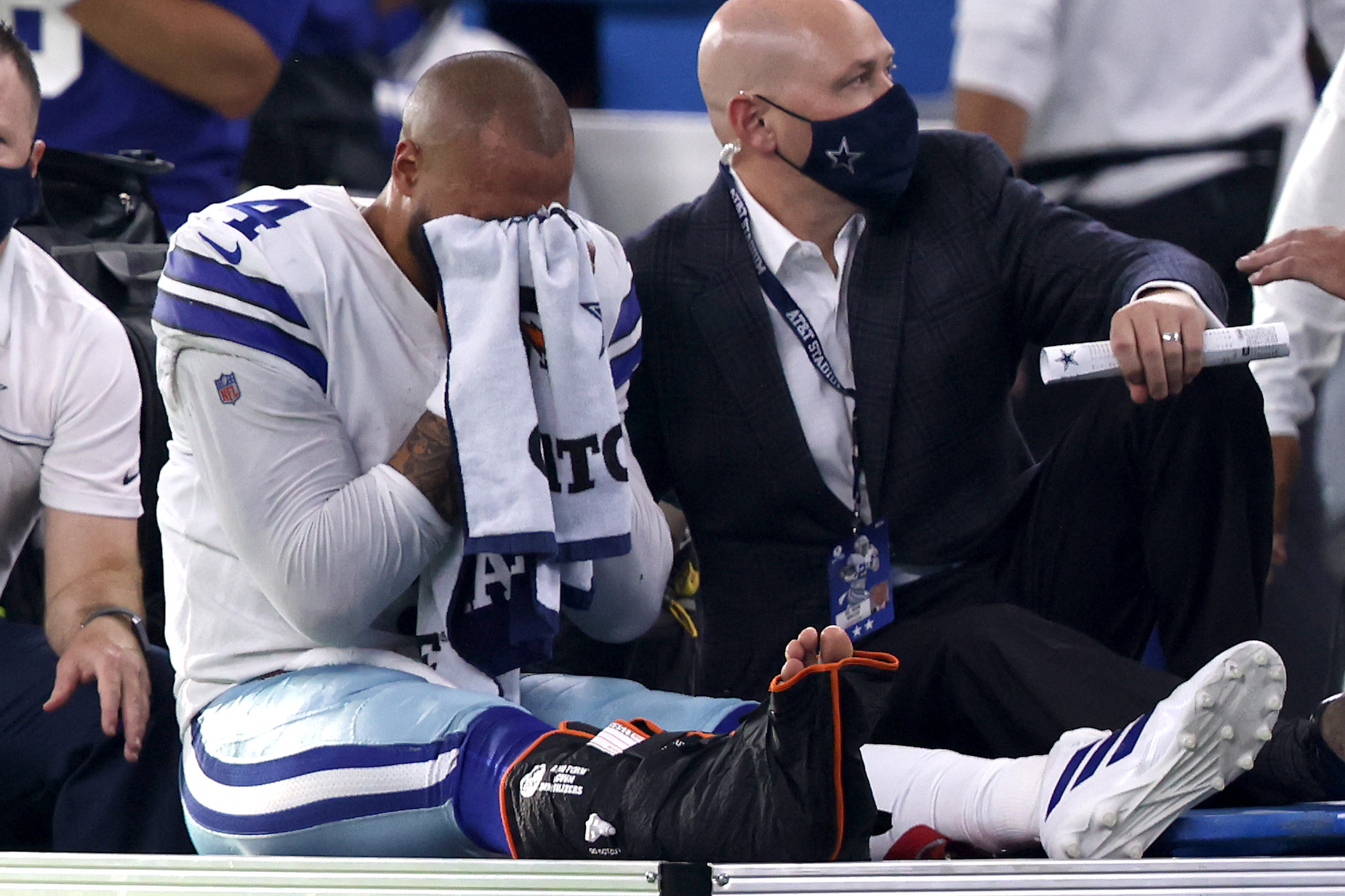NFL
Dez Bryant Wants Jerry Jones To Step Up and Open His Wallet After Dak Prescott’s Brutal Injury

While injuries are simply an unfortunate part of professional sports, some moments still resonate at a deeper, more human level. One of those happened on Sunday night when Dak Prescott suffered a brutal compound fracture and dislocated ankle. As soon as the Dallas Cowboys quarterback went down holding his leg, social media was flooded with an outpouring of well wishes. One of those messages came from Dez Bryant.
Prescott’s former teammate didn’t simply send his regards to the injured quarterback, though. Bryant also called out Jerry and Stephen Jones, telling them to open their wallets and take care of Prescott’s financial future.
Dak Prescott suffered a brutal ankle injury on Sunday night
RELATED: Tony Dungy Just Pissed Fans off With a Foolish Response To Dak Prescott’s Gruesome Injury
While the Dallas Cowboys haven’t exactly been world-beaters through the first quarter of the 2020 campaign, Dak Prescott had been one of the few bright spots for America’s Team. On Sunday night, however, the quarterback’s season probably came to an end.
During the third quarter of a divisional matchup with the Giants, Prescott escaped from the pocket and broke off a nine-yard run. When the dust cleared, however, the quarterback remained on the turf. He was eventually carted off the field and taken to the hospital; Dak was diagnosed with a compound fracture and dislocated right ankle and promptly went under the knife.
While that injury is bad enough in isolation, it gets even worse given Prescott’s contractual situation. Since he and the Dallas Cowboys were unable to come to a long-term agreement during the offseason, Dak was playing on a one-year franchise tender; that means he has no longterm stability and, come the spring, will need to find a new job, which will presumably come at a reduced salary.
Dez Bryant wants Jerry Jones to open his wallet
RELATED: Dez Bryant Reveals How Close He Is to Jerry Jones
During their time in Dallas, Dez Bryant and Dak Prescott formed quite a bond. When the latter player went down injured, the former Cowboys receiver took to Twitter to ensure that he was taken care of.
“STEPHEN JONES JERRY JONES,” Bryant tweeted. “YALL MAKE SURE YALL TAKE CARE OF DAK IF HE CANT PLAY AGAIN.”
Jerry Jones is, of course, the Dallas Cowboys owner and general manager; according to Forbes, he’s worth approximately $8.6 billion. Stephen Jones, in addition to being Jerry’s son, serves as the club’s COO, executive vice president, and director of player personnel.
Dak Prescott probably won’t need Jerry Jones’ help, but his injury shows why athletes play hardball
RELATED: Dak Prescott’s Net Worth Is Probably Much Higher Than You Think
While it’s not clear how Jerry Jones would respond—it’s unlikely that he’d simply cut a blank check, but he could offer Dak Prescott a coaching or scouting job—those measures probably won’t be necessary. According to Spotrac, the quarterback has earned $36 million to date in the NFL; he’ll also be hoping that, barring any complications, he can continue his career as a professional football player.
Prescott’s injury and the mere suggestion of financial help, however, does demonstrate why professional athletes hold out and hit free agency looking for bigger contracts. While NFL players may seem like superheroes on Sunday, they’re actually walking an incredibly thin line; a single injury can take away millions of dollars in potential earnings in a matter of seconds.
Let’s pretend for a moment that Dak Prescott’s injury happened at the tail end of last season. Due to his rookie contract, the quarterback had only made $2.7 million during his first four years in the pros; had he suffered a career-ending injury then, he would have never had the chance to cash in on the open market.
While $2.7 million—or, in the case of this year’s franchise tag, $31 million—is nothing to sneeze at, no one, whether you’re a butcher, baker, or a quarterback, wants to earn less than they believe they deserve. When your ability to make what you feel you deserve can vanish in an instant, advocating for oneself and seeking the best deal possible becomes a bit more understandable.
On Sunday, the entire sports world saw Dak Prescott suffer a brutal injury; everyone from Jerry Jones to Dez Bryant was struck by what happened to the quarterback, purely on a human level. The next time an athlete holds out or advocates for a big-money contract, however, those same sentiments probably won’t remain.











